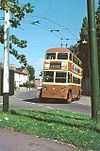Trolleybuses in Huddersfield
Huddersfield
| Huddersfield trolleybus system | |
|---|---|
 Huddersfield trolleybus at the Newsome Road terminus, Newsome South, June 1966 | |
| Operation | |
| Locale |
Huddersfield, West Yorkshire, England |
| Open | 1933 |
| Close | 1968 |
| Status | Closed |
| Routes | 15 |
| Operator(s) | Huddersfield Corporation |
| Infrastructure | |
| Depot(s) | St Thomas’ Rd, Longroyd Bridge[1] |
| Stock | 140 (maximum) - mostly 137 60-seat Karrier E6 (bought 1933-40, withdrawn 1946-63), 52 70-seat Karrier/Sunbeam MS2 (1947-52, 1964-67), 24 72-seat BUT (1952-56, and 10 72-seat Sunbeam S7 (1959, 1967-68). Most had Metrovick electrical equipment, with bodies by Brush, East Lancs, Park Royal, Roe and Weymann. All were 6-wheeled. |
| Statistics | |
| Passengers (1949) | 61,255,937[1] |
The Huddersfield trolleybus system once served the market town of Huddersfield, in West Yorkshire, England. Opened on 4 December 1933,[2][3] it gradually replaced the Huddersfield tramway network, which closed on Saturday, 29 June 1940.[4]
By the standards of the various now-defunct trolleybus systems in the United Kingdom, the Huddersfield system was a medium-sized one, with a total of 15 routes and a maximum fleet of 140 trolleybuses.[3] It was closed on 13 July 1968.[2][3]
A notable feature of the system was the Longwood trolleybus turntable, which was one of only four such turntables ever to have been constructed in the UK. The turntable was manually operated, and was in use only in 1939–1940 until wartime conditions forced the introduction of other arrangements. However, it remained in situ until demolished in the 1980s.
Three of the former Huddersfield trolleybuses are now preserved, at the Trolleybus Museum at Sandtoft, Lincolnshire.[5]
History
The first conversion was the 1.9 mi (3.1 km) Almondbury tramway. It was converted in sections with a temporary motor bus link as the road was resealed and electrified.
Six different 6-wheel buses were bought to trial on the route with Karrier, Ransomes and Sunbeam chassis and bodies by several builders. Most later buses were Karrier, though the local factory had closed.
The Almondbury route closed on 14 July 1965. The dates of the rest were:-
| Terminus | opened | closed | |
|---|---|---|---|
| Lindley and Outlane | 11/11/34 | 13/7/68 | |
| Newsome | 2/5/37 | 13/7/66 | |
| Crosland Hill | 3/10/37 | 5/4/64 | |
| Birkby/Fartown Bar | 7/11/37 | 5/4/64 | cut back to Wasp Nest Rd due to danger of using Woodbine Rd turning circle in wartime blackout. |
| Marsden | 10/4/38 | 30/1/63 | |
| Sheepridge | 19/6/38 | 13/7/66 | extended to new Brackenhall estate 5/3/49 and circular via Woodhouse closed. |
| Bradley | 19/6/38 | 12/7/67 | extended to Keldregate 2/4/56 using poles recovered from Brighouse section. |
| Woodhouse | 19/6/38 | 13/7/66 | extended to Riddings estate 5/3/49. |
| Longwood | 1/1/39 | 12/7/67 | due to a low bridge the tram route to Honley was taken over by buses. |
| Lockwood | 12/1/39 | 13/7/66 | |
| West Vale / Elland | 28/5/39 | 8/11/61 | |
| Fixby / Brighouse | 30/6/40 | 14/7/65 | cut back to Fixby 9/7/55 due to increasing traffic creating problems when reversing at Brighouse. |
In 1958 Edgar Dyson became general manager. The council then agreed to a closure programme, ending with 5 crowded Outlane buses on 13 July 1968. Rates paid to the county council were among resons for early closure of the West Vale and Marsden routes.[6]
See also
References
Notes
- ↑ 1.0 1.1 Huddersfield Passenger Transport Group - photos and history
- ↑ 2.0 2.1 Joyce, J.; King, J. S.; and Newman, A. G. (1986). British Trolleybus Systems, pp. 69–72, 159. London: Ian Allan Publishing. ISBN 0-7110-1647-X.
- ↑ 3.0 3.1 3.2 Short, Peter. "Former UK systems". British Trolleybus Society. Retrieved 15 March 2011.
- ↑ Huddersfield Passenger Transport Group - HUDDERSFIELD CORPORATION TRAMS - photos and detailed tram history
- ↑ Zebedee, John (30 November 2010). "A List of Preserved Trolleybuses in the UK". British Trolleybus Society. Retrieved 16 March 2011.
- ↑ King, J S (January 1971). Buses: Ian Allan: pages 5–13. Missing or empty
|title=(help)
Further reading
- Berry, Robert (2005). Buses in and around Huddersfield. Kendal, Cumbria, UK: Nostalgia Road Publishing. ISBN 978-1-903016-62-6.
- Booth, Gavin (2007). Bus Operators 1970: North West England and Yorkshire. Hersham, Surrey, UK: Ian Allan Publishing. ISBN 978-0-7110-3202-6.
- Lockwood, Stephen (2002). Huddersfield Trolleybuses. Midhurst, West Sussex, UK: Middleton Press. ISBN 978-1-901706-92-5.
External links
![]() Media related to Trolleybuses in Huddersfield at Wikimedia Commons
Media related to Trolleybuses in Huddersfield at Wikimedia Commons
- Trolleybuses Galore! - Huddersfield trolleybuses fan site
- National Trolleybus Archive
- British Trolleybus Society, based in Reading
- National Trolleybus Association, based in London
- Huddersfield Examiner Trolleybus gallery
| ||||||||||||||||||||||||
